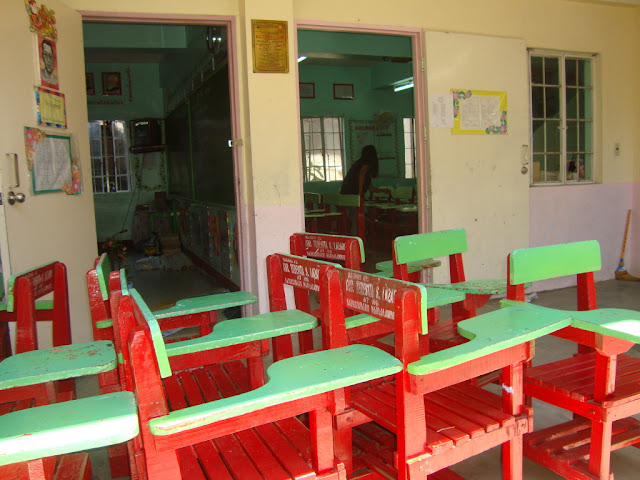Brigada Eskwela: Pictures of Hope
 |
| These photos were taken from Quinale Elementary School in Paete, Laguna and were provided by its vice mayor, Rojilyn "Mutuk" Bagabaldo. |
 |
The photos above clearly depict how much a community could contribute to the basic education of its youngest members. The possibilities are indeed good reasons for optimism. Total commitment of the community as in utilizing and mobilizing all of its resources, manpower and talent, is key to attaining "Education for All". Such is part of the spirit of the Basic Education Sector Reform Agenda (BESRA) of 2005. This reform recognizes the need for broad participation and support of initiatives that originate from the community in improving basic education in the Philippines. It is a reform that is more in line to what succeeded in Finland, a system that thrives on sustainable leadership of the community, one that upholds creativity, equity and flexibility, such that each one is able to give the very best to the system. Of course, BESRA, to be successful, requires a dramatic change in culture within the Department of Education.
Noted in a paper by the Foundation for World People Power years ago on BESRA:
"The preparation of each policy proposal included in the BESRA shall follow the careful, deliberate, research-based, participatory and interactive process that marked the manner of preparing the whole BESRA itself. Actual data, available facts and scientific research shall inform the policy preparation process. Consultations, public hearings, peer reviews, solicitations of positions papers, among other means of securing contributions from all concerned and interested, shall be required prior to the formulation of any draft policy proposal. The membership of the task teams shall seek to represent those closest to the issues in order to assure that their concerns are incorporated in the very process of formulating policy proposals. The discussions and deliberations undertaken in the course of formulating all policy proposals shall be fully and adequately documented."
The sense of where reforms should come from is quite clear. And the photos demonstrating how much a community cares for its schools is a testament that improvements in basic education can begin from the ground. Flexibility is important as it allows for the community to build on its existing good practices and innovation. Herein lies the importance of keeping the national curriculum for schools as lean as possible, offering only a general set of guidelines for schools to follow. Such empowers the teachers in each classroom, each principal in each school, to develop in greater specifics a school-based curriculum. The community can only take ownership of its schools with responsibility. And responsibility can not be cultivated in a culture marked with policies and orders always handed down from a central authority. Decisions regarding the curriculum must take place inside the school and not from a far-away office within the national government if a "Schools First" initiative is desired. Communities are capable of taking the challenge, but the challenge must not end with just supporting the facilities for education. Communities must likewise be empowered to take part in the actual education of its members. Through these, there is reason for optimism.
Is K to 12 in line with BESRA? Clearly, the answer is no.
The following are additional pictures taken from the other schools in Paete, Laguna (Paete Central Elementary School, Ibaba Elementary School, and Poten and Eliseo Quesada Memorial National High School):
 |
| Thank you very much, Vice mayor Rojilyn "Mutuk" Bagabaldo (center), for providing these photos. |





























Comments
Post a Comment